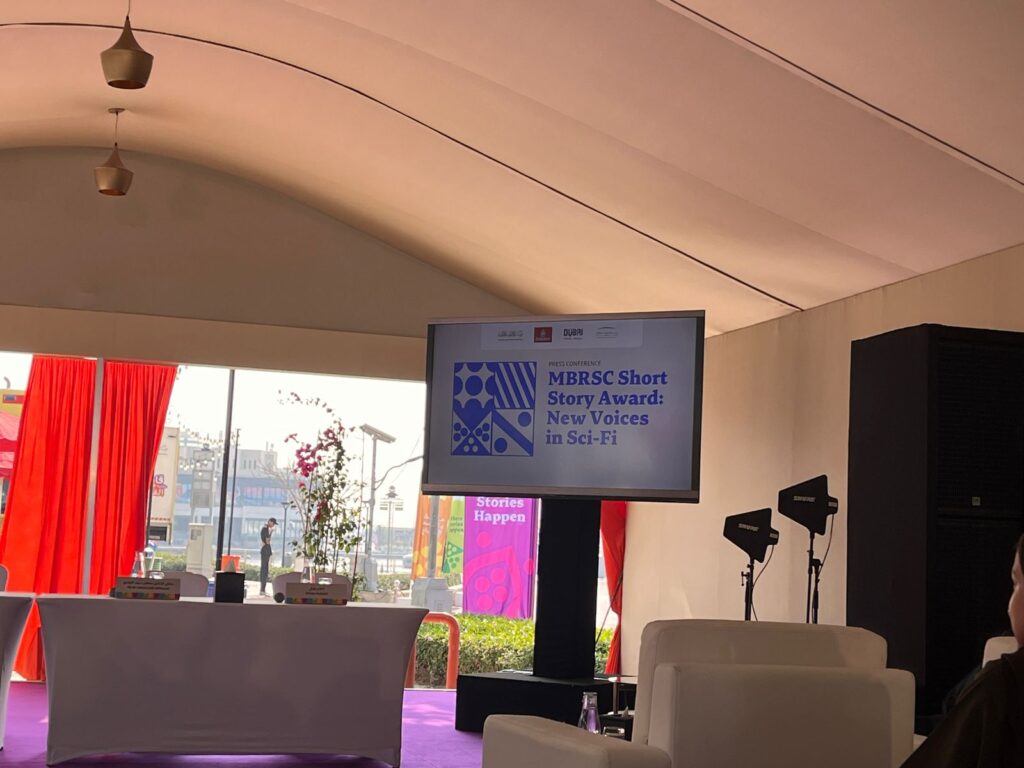
- ARAB NEWS
- 18 Jul 2025

DUBAI: Dubai’s Emirates Litearture Foundation (ELF) and the Mohammed Bin Rashid Space Center (MBRSC) announced on Thursday that they will launch a science fiction short story competition in the UAE, during which the latter mentioned that the use of generative artificial intelligence will be “encouraged”.
The announcement took place at Dubai’s Intercontinental Hotel with the presence of Sultan Al Nayadi, UAE’s Minister of State of Youth Affairs; Salem Al Marri, MBRSC’s Director General; Isobel Abulhoul, ELF’s Founder; and Ahlam Bolooki, CEO of ELF.
Aiming to inspire the new generation of writers, the ‘MBRSC Short Story Award: New Voices in Sci-Fi’ competition will be open for English and Arabic writers who are between the ages of 16 and 30.
“Things like ‘Star Trek’ and ‘Star Wars’ inspired me,” Al Marri said. I really pushed to go to space and when there was an opportunity to work at a space center and build satellites… that was something that I jumped on because during my youth I loved science fiction and really wanted to be part of space.”
When asked about whether generative AI tools, such as ChatGPT, can be used in the submitted works, Al Marri said there should be rules but the usage of them should be accepted.
“If this is a sci-fi competition and somebody used something that used to be part of sci-fi, we would encourage that. Maybe you don’t want the whole story written using ChatGPT but if some elements are there, we would accept it,” MBRSC’s Director General said.
Al Nayadi echoed a similar statement, saying, “I think the committee should be able to distinguish between real writing and material that is AI (but) we shouldn’t restrict the creativity.”
“We can work hand in hand with whatever technology is available and whatever is inspiring and deliving the message that we initiated in this competition,” he added.

The usage of AI in literary works has sparked debate amongst readers and critics in the last few years. In 2024, Japanese author Rie Kudan won the Akutagawa Prize award, Japan’s most prestigious literary award, for her sci-fi futuristic novel ‘Tokyo Sympathy Tower’. She admitted that generative AI tools helped her write around 5% of the whole story. Similary, in 2023, a Chinese professor won in a literary sci-fi competition for a story entirely written by AI.
During the announcement, Abulhoul argued that AI is not creative enough to write innovative stories. “I can do so many things with (AI) but do not try giving it (a prompt) to write a creative story because all it will come up with is the sort of cliche ideas the judges who will be looking at know about.”
“We are looking for the brains of human beings to come up with those creative kinds of ideas. It’s going to be a chess game between humans and AI to be able to judge this competition,” she added.
Reflecting on her personal experience, Bolooki said that prompting AI to write creatively requires creativity from the person themselves. “I was on a judging panel for an AI prompt engineering competition in the literature category last year, and those who were ranking highest were those who had the most input and were challenging what was coming out.”
“Just watching the process and how they were prompting was something we have never seen before. I think there is still a lot of creativity required and how you interact with the AI because if you don’t, then it will be very obvious,” the CEO shared.
Details regarding the judging panel and AI usage have not been announced yet but ELF and MBRSC hope the stories that will come out of the competition will shape the future of space exploration as well as the Arabic sci-fi genre.
“Sometimes those ideas (in the stories) can become reality. We have seen that happen in the past. Maybe they can inspire new engineers to look at a new way of doing things. Imagine if that is done in Arabic. That is one thing maybe we are lacking in our region is that there is not a lot of science fiction,” Al Marri said.
The winners will be announced during the 2026 edition of the Emirates Airline Festival of Literature, while the winning stories are expected to be featured in the 2027 edition.
Established in 2006, the MBRSC is a Dubai government organization that promotes space advancements in the UAE. The organization has previously collaborated various times with Japan. In December, the Japan External Trade Organization hosted a space-related workshop in Abu Dhabi, where they hosted MBRSC and various other companies to discuss the developments in the space industry.